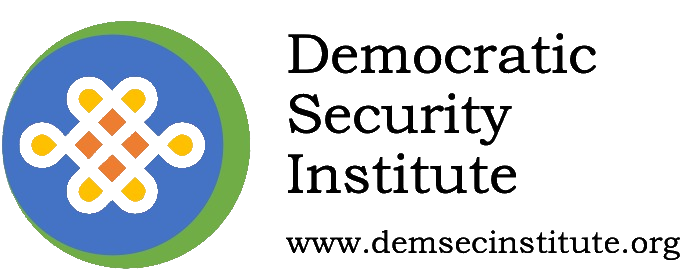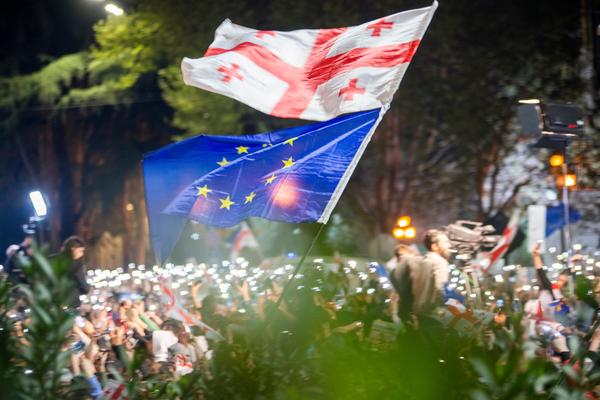By Diana Lezhava
No one disputes that 2024 has been a tough year for Georgia, pivotal in many senses. It began with the introduction of the Law on Transparency of Foreign Influence (the “foreign agents bill”) and continued with the adoption of anti-gay legislation.
More recently, rigged elections have brought international condemnation and non-recognition by the Georgian president and opposition, resulting in the disintegration of Euro-Atlantic integration and a likely constitutionally illegitimate government. This turmoil has been accompanied by the attack on freedom of academia that is relatively less discussed but fundamental in essence for the democratic development.
Why do these developments threaten academia? How does rapid democracy backsliding and deteriorated relations with EU and US undermines everything Georgian academia has achieved so far? Ongoing mass protests and a general education strike as a result of regime overreach puts these questions into sharp relief.
The “foreign agents bill” specifically targets the non-governmental sector and media, which is catastrophic for democratic development. But what has been only discussed by a group of academics united under the movement “Georgian Education Under Threat” and thus, has not resonated in the public discussions at large, is how seriously it affects the performance of the academia. This legislation affects Georgian higher education in a several profound ways.
First, Article 8, Point 3 of the law allows the authorized representative of the Ministry of Justice to demand any information including the personal data covered under the Article 3(b) of the Law of Georgia on Personal Data Protection from everyone they decide to address. In particular, the law does not specify whom they can question during this investigation, only those who are somehow related to any media or non-governmental organizations or anyone, or whom the requested information can be related to. Therefore, this provision gives ground for a very broad interpretation.
The Ministry of Justice can address any individual, including researchers who have an ethical obligation to always protect the confidentiality and anonymity of their research respondents and protect data, and demand any information, including special categories of data. Therefore, there is a dilemma now, violate the major principle of your entire work, jeopardize and undermine your international reputation of a scholar, or disobey the law. This will have a chilling effect on knowledge production and research across all disciplines, and fundamentally cripple the ability to conduct research.
Secondly, several higher education institutions (up to 15%) have a status of non-entrepreneurial (non-commercial) legal entity, thus directly forcing them to get registered in the database of the foreign influence when and if they get at least one big research and/or capacity development foreign grant, which might exceed 20% of their annual income. This means some universities must declare themselves as foreign agents and will be obligated to publicly share the personal information of everyone who is related to that university, including students, academic and administrative personnel, foreign partners, or whoever the government thinks needs to be included in the database. This not only undermines the overall academic reputation of an institution but would isolate it from the academic communities for being an “agent” or for being obliged to publicly share such information.
Given events in recent months and the increasingly repressive methods employed by the Georgian Dream government, it’s only a matter of will and time before these instruments are deployed. GD has already pledged to “take care” of universities, as promised by Prime Minister Irakli Kobakhidze in May, in response to student mass protests. He promised fundamental and painful reforms in higher education and accused university professors, especially from Tbilisi State University, of political bias and lack of professionalism.
The adoption of the “foreign agents bill” and its accompanying mass protests have overshadowed no less important and dangerous Law on the Protection of Family Values and Minors. Largely, this law “cancels” the existence of LGBTQI+ communities by forbidding this group to manifest or hold public assemblies, broadcast publicly any information about, change biological sex, alter the official documentation, etc. For a patriarchal, homophobic-prone society, this law was not a focus of major controversy. However, it contains way much more than it is visible on the surface.
Namely, Article 8 of the law specifically targets educational institutions of all levels, including higher education and forbids including or disseminating information that can somehow “popularize” any gender identity that is different from biological sex or any sexual relationship between the representatives of the same biological sex. The adoption of this law was accompanied with the amendment of number of laws including Law of Georgian on Higher Education to incorporate a new Article 3(1) in it, which basically repeats the abovementioned.
So, what does it say overall? It says that starting from December 2024 if in an educational setting “an impartial observer” decides that something said by a professor/lecturer is somehow popularizing LGBTQI+ topics in a positive or exemplary way, it is an infringement of the law, and that professor will face serious consequences, such as financial fines, deprivation of the academic position or working permission up to three years or even imprisonment for up to two years.
This not only homophobic but also a nakedly authoritarian law that targets a specific group and, in doing so, violates the Constitution of Georgia, which guarantees dignity and fundamental rights of all individuals—as well as academic freedom and university autonomy (see Article 27, Point 3). Today, anyone who will somehow touch upon the topic can be accused of law infringement, whether it is teaching Plato’s Symposium in philosophy or literature, gender dysphoria in psychology and psychiatry, or human rights in law. Not to say anything about the whole discipline of gender studies becoming illegal. In short, this is nothing but an old classical censorship in the Soviet style with its accompanying legalized mechanism of denunciation that creeps back into academia.
Unfortunately, there are many other mechanisms that have been deployed to restrict academic freedom. Among them the state authorization, an official licensing procedure that every higher education institution is obliged to go through in Georgia. The case of Ilia State University was perceived as a clear attack on the university autonomy and academic freedom because of its dedication to what we call “third mission of the university”, i.e. civil activism, participation in public protests, and open attitudes towards ongoing processes in the country. There have been rumors about using this mechanism for the sake of political interests previously (the case of International Black See University is a good example for it) and surely, it will be deployed in future to strangle “disobeying” universities in future as well, especially under the circumstances when law becomes just a political weapon and not an art of justice.
Seemingly, all this should have united Georgian academia, and there have been a few unions that have tried to manifest and protest against the devastating events; a few academics posting here and there that they won’t be able to speak about Frida Kahlo or Almodovar and some disciplines might even disappear. But it is obvious that the Georgian society at large does not fully understand the devastating effects these processes will have on the higher education system of Georgia, which is still at its early years of development, freedom and what is most importance, understanding of its enormous role for the democratic development.
To sum it up, the overall situation of the country directly turns the higher education system and what it has achieved for the past decades upside down and puts it at the major crossroads since independence. Censorship, restriction of academic freedom and potential repressions covered under the announced “painful reforms” by the GD creates a sense of defenselessness, contributes to the fear of indefinite future for the Georgian academia that might face isolation and return to the Soviet-like captivity instead of service to freedom and independent thought. And now the major question arises: how can Georgian higher education system resist – sink to the bottom of the ocean or unite the best minds to think of potential ways out apart from public demonstrations to save at least what is remaining from the Georgian resistance?
Diana Lezhava is a higher education and civil society expert and a PhD candidate at Tbilisi State University. She is the Administrative Director of the Democratic Security Institute.

